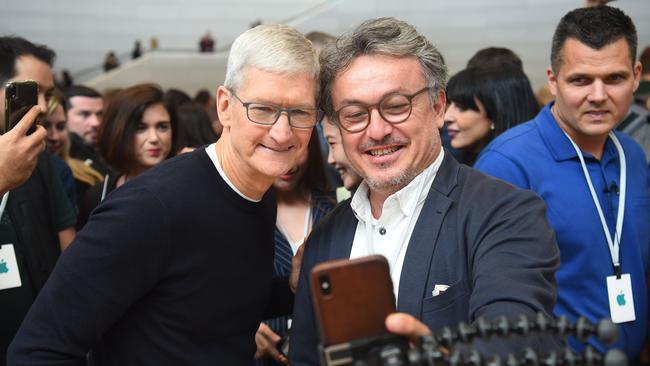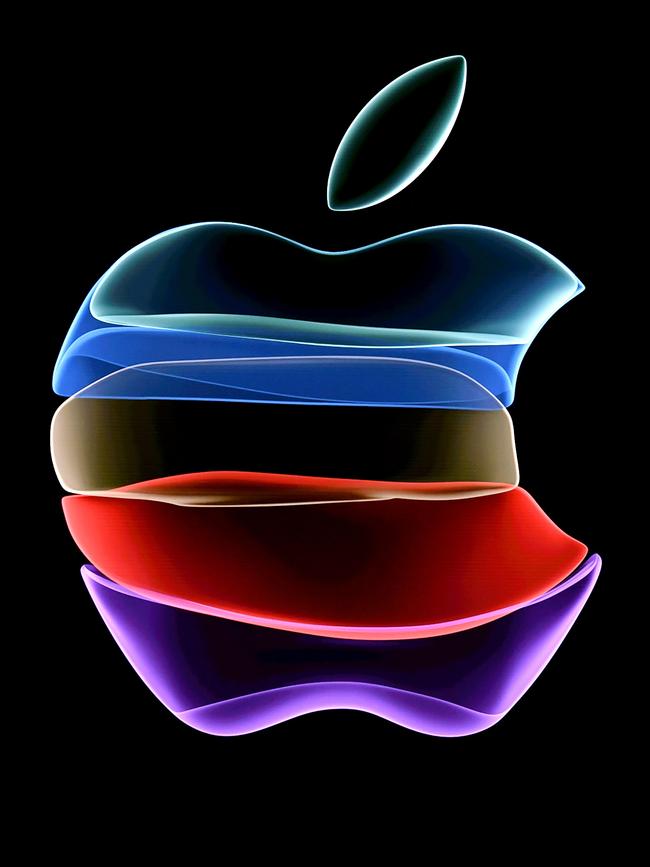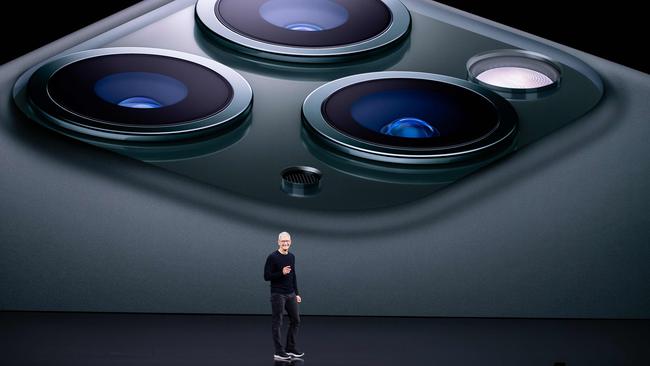Apple’s new iPhone to make a big splash with streaming
The world’s most valuable public company is planning to unveil a new line of iPhones that will operate on 5G networks.

Product launches at Apple are much more subdued affairs than they were in the days of Steve Jobs. In his pomp, the company’s charismatic co-founder and chief executive would pace the stage in his black polo-neck and trainers, bewitching the crowd with the latest technological leap.
The razzamatazz has long since disappeared – and is not down simply to his successor’s introvert nature. In recent years Tim Cook has not had as much to flaunt; new iPhones typically have featured only modest improvements over the last version.
All that could change on Tuesday US time. The world’s most valuable public company is planning to unveil a new line of iPhones that will operate on 5G networks. Rumours are swirling ahead of the launch and Apple is heavily tipped to unveil four versions of the 5G-enabled iPhone 12.
From a European vantage point, this may not seem like a seismic shift – telecoms companies in this part of the world have been slow to install the faster system – but 5G is being rapidly deployed in the US and especially Asia.
By the end of the year, 180 million Chinese consumers are expected to have the lightning-quick service.
Despite the economic traumas of Covid-19, some Wall Street analysts predict that the new devices could unleash a “supercycle” of iPhone sales. Wedbush Securities, a brokerage, estimates that 350 million of the 950 million people who own an iPhone worldwide have come to the end of a fixed contract and are primed for an upgrade.
That not only would boost the revenue that Apple earns from hardware, but also its services business. App Store fees, video streaming, music, gaming and cloud storage have become an increasingly important sideline for Apple, which Mr Cook has turned into the world’s most valuable company during his nine-year reign.
Jobs, who died in 2011, and Steve Wozniak, 70, founded Apple in 1976 and for the first half of its life the company delighted the technology cognoscenti with cleverly designed computers and intuitive software. However, it failed to break into the mainstream.

At the turn of the millennium, Jobs liberated Apple from its niche status thanks to a flurry of hit gadgets, including the iPod, iPhone and iPad. These days Apple employs 137,000 people globally and is based in a $US5 billion ($6.90bn) headquarters in Silicon Valley, California.
It took 42 years for Apple’s market valuation to breach the $US1 trillion mark, a feat that it achieved in August 2018, but only a further 24 months to break the $US2 trillion barrier. A good chunk of this can be explained by Mr Cook’s efforts to drive its services business.
Over the past three years, Apple’s financial performance has been relatively pedestrian; turnover rose from $US229bn in 2017 to $US260bn last year, with net income up from $US48bn to $US55bn.
But the composition of its revenue has undergone a subtle change; sales of services rose from $US33bn to $US47bn between 2017 and last year. The stock market ascribes a much higher rating to the recurring revenues that online services enjoy, compared with sales of hardware.
Apple recently said that it had 550 million subscriptions, up from 420 million a year ago.
So if Apple is tilting towards services, why the fuss over this product launch? Because the iPhone still accounts for 55 per cent of revenues and, more importantly, it is the flywheel that drives the Apple money machine.
“The iPhone remains highly profitable and it is the key product in terms of providing a hook for consumers,” Neil Campling, a technology analyst at Mirabaud, the stockbroker, said.
Some of the services that Apple offers on monthly subscriptions earned “extremely high margins”, he added, with the notable exception of music. “Apple can offer storage on the cloud for a very competitive price and the incremental cost of going from 40 million TV subscribers to 500 million is zero because Apple has already paid to license or produce the content.”

In a push for more price-conscious consumers, it is likely to unveil two smaller and cheaper models of its iPhone 12 this week, among four models. At the higher end, the company is said to have developed its largest ever iPhone, a 6.7 inch device aimed at gamers and the Asian market.
The company also could press the button on its Apple One packages: bundles of services priced at a discount to the cost of buying them separately. This month the company said that it would charge $US15 a month for its entry-level music, television and video package, rising to $US30 with games, fitness, news and cloud storage included.
Rivals have already cried foul. Spotify described the bundles as an abuse of power and called on competition authorities to “act urgently” to prevent Apple causing “irreparable harm” to app developers. It has lodged a complaint with the European Commission, arguing that the 30 per cent commission on app store revenues gives Apple’s music offering an unfair advantage
The scrap with Spotify is far from Apple’s only legal and regulatory battle. In the past week a committee of the US House of Representatives accused the company of reaping “supra-normal profits” from its “monopoly power” over the distribution of apps. Apple is facing off against Epic Games, the creator of Fortnite. Tim Sweeney, Epic’s founder, claims that the commission rates stifle innovation.
Apple earns between $US10bn and $US15bn a year from App Store commissions and denies abusing its position.
It says the download store creates a safe, secure space for customers to buy apps and provides a shopfront for creators to make their fortunes. However, if the new iPhone lineup gives a further boost to its services division, the calls for tighter regulation are going to get louder.
The Times



To join the conversation, please log in. Don't have an account? Register
Join the conversation, you are commenting as Logout